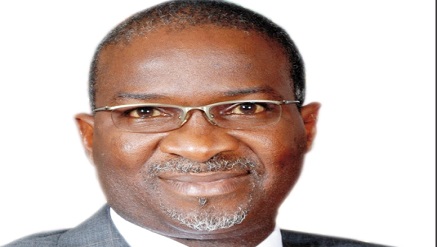News
Fashola to Commission Candel’s Agrochemicals Manufacturing Plant

The Candel Company Limited, Nigeria’s leading agricultural inputs development and Distribution Company has announced that its integrated manufacturing facility for crop protection chemicals and foliar fertilizers at the Lekki Free Zone, Lagos is set for commissioning by Mr. Babatunde Fashola, executive governor of Lagos State.
The event which holds on Tuesday, May 26th means the Multi-Billion Naira project which is only in its first phase when completed will deliver a facility with a capacity for 80 million liters of formulated products per annum.
It will enable Candel to deliver solutions most suited to Nigeria’s tropical climate and peculiar farming systems.
There is currently no local production of crop protection agrochemicals in Nigeria with over $400 million in foreign exchange expended annually to import them.
Crop protection chemicals protect crops from weeds, pests and diseases when in the field, during transportation and in the store and are helping the quest for increased crop yields and better preservation by Nigerian farmers.
Candel’s factory is configured to produce products specially targeted at small scale farmers as well as customized formulations with different surfactant levels for large scale farmers.
The facility has five process plants for Soluble Liquids (SL), Emulsifiable Concentrates (EC) and Suspension Concentrates (SC) of products from diverse chemical families.
It has sufficient capacity to supply Candel’s own distribution network in Nigeria and Ghana with enough spare capacity for third parties in Nigeria and overseas. The target of the international market influenced its location at the Lekki Free Zone.
Construction of the production facility began in early 2014 after an extensive Environmental Impact Assessment (EIA) exercise under the full supervision and guidance of the Federal and Lagos State Ministries of Environment.
Charles Anudu, chairman of The Candel Company underlined the company’s innovative and entrepreneurial spirit as well as the many years of experience in the field of crop protection and nutrition thus: “Our company has a reputation for being at the leading edge of innovation and entrepreneurship that have helped to frame our industry in the context of the local realities. Our world class factory is geared towards tailor-made solutions that address the peculiarities of our farming systems thereby improving the industry economics and competitiveness of West Africa’s crop farmers”.
On his part, Mr. Emmanuel Kattie, managing director of Candel said, “We are determined to restore the quality standard that has since declined in our industry by ensuring that every product that is made in our facility meets the highest international standard for such a product. Nigerian farmers will get peace of mind when they buy any of the products made in this factory.
“We are very pleased that Candel chose the Lekki Free Zone to site its pioneering project and happy with the rapid progress and quality of construction so far. Projects of this nature create highly skilled and entry-level job opportunities for our local communities which is a major benefit of a Free Zone like ours. We will continue to ensure that the framework conditions are attractive for serious investors like Candel, especially with our state-of- the-art infrastructure” enthused Mr. Yonghua Ding, the Managing Director of the Lekki Free Zone Development Company (LFZDC)”.
The Candel Company Limited is one of West Africa’s leading companies offering an outstanding range of products including high value seeds, innovative crop protection solutions and market access support services that improve the industry economics of West Africa’s farmers.
With an extensive footprint in Nigeria and Ghana, and a major agrochemical production facility at the Lekki Free Zone, Lagos, Nigeria, Candel is playing a major role in addressing the peculiar farming systems of West Africa’s farmers, improving the quality of products offered to them as well as reduce the pressure on foreign exchange to import these products, which are often of questionable quality.
News
Experts Caution e-commerce Operators on Eco-friendly Materials

Experts have urged the Nigerian e-commerce industry to use eco-friendly materials in its packaging and logistics of products to reduce carbon emissions and protect the environment.

The experts made this known at a sensitisation workshop on Greening E-commerce orgainsed by The Sustainable and Inclusive Economic Development for Decent Employment In Nigeria Programme (SEDIN) – an initiative of the German Development Agency (GIZ) in partnership with Nigerian Postal Services (NIPOST).
The experts stressed the importance of e-commerce operators in Nigeria committing to concrete climate actions and sustainable operations.
Nnaemeka Ngwu, director of the public sector initiative and a professor at Lagos Business School, urged e-commerce companies to quickly adopt sustainable green technology to minimize their environmental harm.
“E-commerce is a business enabler and a platform through which many people can get involved in trade and commerce. However, e-commerce also brings lots of issues in sustainability and climate change because of pollution,” he said.
According to him, to improve the sustainability component of e-commerce, the country must promote better packaging and logistics among operators.
“We need to green the e-commerce industry to make it more inclusive and support the climate so that it does not cause risks and issues,” he explained.
He commended the Lagos State government on the ban on single-use plastics, calling for the policy to be complemented with awareness, advocacy, and engagement so that the public understands the reason for the policy.
He noted that such awareness should be done regularly, while urging the Nigerian Postal Service to use its leadership role in the courier industry to engage other courier businesses within the space on the benefits of sustainability and the packaging and logistics issues.
In her opening remarks, Titi Oshodi, special adviser to the Lagos State Governor on Climate Change and Circular Economy, called for awareness on greening across various sectors of governance, communities and the private sector
“This will ensure that people understand the rationale behind the policies on greening and they also understand what the alternatives are,” she noted.
“This is the reason why climate literacy is a front-boner strategy for us in Lagos State,” she added.
She explained that Lagos is a commercial hub that grew its GDP due to the operations of micro, small and medium-size businesses. “We need to have them empowered, more knowledgeable about sustainability practices.”
Tola Odeyemi, postmaster-general, Nigerian Postal Services (NIPOST), said the courier can play a strategic and vital role in greening the ecosystem, noting that it has 1,174 post offices nationwide.
Odeyemi, who was represented by Ernest Mamood, general-manager of EMS Parcel Nigeria, said NIPOST is a regulator in the country’s courier industry and can use its position to sensitize other operators in the industry on the use of eco-friendly materials in packaging and logistics to cut environmental impact.
News
Tech Alliance Aims to Transform Africa’s Mapping System

Space42, the UAE-based global AI-powered space-tech company, part of technology group G42, this week announced the signing of a memorandum of understanding with Microsoft and Esri to deliver high-resolution, scalable base maps across all 54 African countries, serving over 1.4 billion people.

Known as the “Map Africa Initiative,” the project will create a comprehensive base map of the continent to date, addressing challenges in infrastructure, investment, and institutional gaps, according to Space24.
The company said the updated mapping system will catalyse economic development through increased access to intelligent solutions that support governments, businesses, and communities.
The five-year collaboration aims to strengthen geospatial capabilities across Africa and the UAE, and provide precise and accessible data to national and regional stakeholders.
Space 24 detailed how the initiative will enable economic opportunities and innovation, saying the program is expected to unlock long-term value across multiple industries including: ports and logistics; renewable energy; security and disaster response; smart cities and digital economies.
It added: “Accurate maps are foundational to urban planning, public services, and technology deployment. The data will be licensed to national governments, enabling ownership and long-term updating by National Mapping Agencies. Over time, the initiative will also support a new commercial ecosystem of African startups. The data will eventually be housed in G42 and Microsoft-managed data centers across the continent.”
Hasan Al Hosani, CEO of Smart Solutions at Space42, said: “Partnership is core to the UAE’s DNA, and is central to how Space42 operates. This collaboration with Microsoft and Esri is more than technical; it’s strategic. It advances Space42’s business priorities, strengthens our role as a trusted partner to governments, and delivers meaningful benefits to communities across Africa.
“Accurate, high-quality mapping and the intelligence solutions built on it are essential for growth, resilience, and inclusive innovation. With reliable data, communities and economies prosper.”
While, Jack Dangermond, president of Esri added: “We are proud to support the Map Africa Initiative in partnership with Space42. Transforming satellite imagery into detailed, accurate base maps at continental scale requires advanced geospatial technology and professional production workflows.
“These same capabilities have supported similar national and regional mapping efforts around the world. With Map Africa, we are helping to establish a foundational resource that will drive infrastructure planning, economic growth, and sustainable development across the continent.”
News
Kenya Tops Global Rankings for ChatGPT Use

Kenya has emerged as the global leader in the adoption of ChatGPT, with a higher percentage of its internet users utilizing the AI chatbot than any other country.

According to the July 2025 Global Digital Report from DataReportal and Meltwater, an astounding 42.1% of Kenyan internet users aged 16 and above used ChatGPT in the past month.
This remarkable statistic places Kenya at the forefront of a global shift towards integrating artificial intelligence into daily life, outranking traditionally tech-forward nations such as the United Arab Emirates (42%), Israel (41.4%), Malaysia (39.8%), and Brazil (39.7%). In contrast, major economies like Russia (10.8%), China (7.3%), and Japan (5.8%) showed significantly lower adoption rates.
The report, which provides a comprehensive snapshot of digital trends worldwide, also highlights Kenya’s significant contribution to the platform’s overall traffic. The country is ranked third globally in website traffic to ChatGPT, accounting for 4.81% of all global visits, trailing only the United States and India.
Analysts attribute Kenya’s rapid and widespread adoption of ChatGPT to two primary factors:
- A Young, Tech-Savvy Population: With a median age of just 20, Kenya has one of the youngest populations in the world. This demographic is highly digitally native and has been quick to explore and adopt AI tools for a wide range of purposes, including education, business operations, and content creation.
- High Mobile Internet Penetration: Over 48% of Kenya’s population uses the internet regularly, with the vast majority accessing it via mobile devices. The accessibility of AI tools like ChatGPT on smartphones has been a critical enabler of its adoption, even in semi-urban and rural areas.
The report’s findings come shortly after OpenAI, the creator of ChatGPT, revealed that the platform now handles over 2.5 billion prompts globally every day. While OpenAI did not provide a breakdown of these prompts by use case, the platform’s popularity for tasks ranging from writing and coding to research and brainstorming is undeniable.
Kenya’s top ranking is a powerful indicator of the country’s dynamic and fast-evolving digital landscape, showcasing an eagerness to embrace cutting-edge technologies and positioning the nation as a key player in the future of AI adoption in Africa.

 Telecom2 days ago
Telecom2 days agoHistory as MTN Nigeria Becomes First to Hit ₦10 Trillion Market Cap @ NGX

 Telecom2 days ago
Telecom2 days agoMTN Nigeria’s CAPEX Soars Nearly 300 Percent to ₦565.7Bn in Q1 2025

 Telecom2 days ago
Telecom2 days agoMTN Nigeria Celebrates Super Falcons with ₦150 Million Reward After WAFCON Triumph

 Broadcasting3 days ago
Broadcasting3 days agoNCC Suspends MovieBox.ng over Alleged Piracy

 E-Business3 days ago
E-Business3 days agoAfrica Tasked to Fast-track AI Skills Development

 News3 days ago
News3 days agoTech Alliance Aims to Transform Africa’s Mapping System

 General News2 days ago
General News2 days agoNigeria Sends Egusi, Others to Space @ NASA’s Crew-11 Mission Launch

 General News3 days ago
General News3 days agoBank Staff Arraigned for Allegedly Defrauding Customer of N423m













